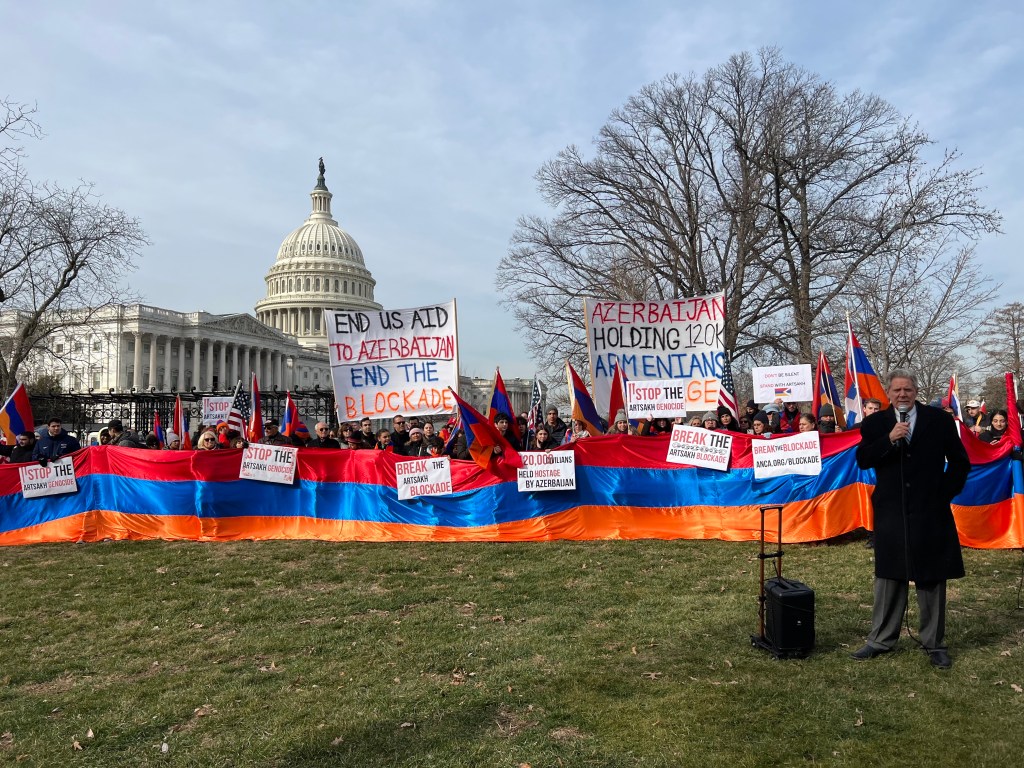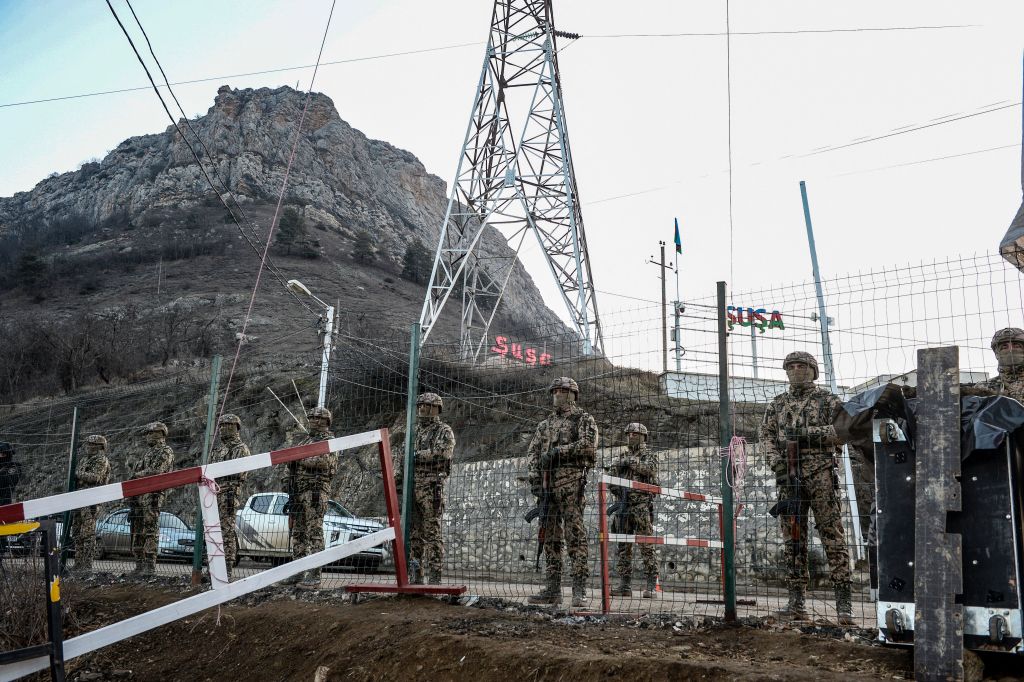When Emma Mamunts left the Armenian capital Yerevan to visit her family in December, she didn’t think she’d become part of an international humanitarian crisis. But for nearly two months the 23-year-old—along with about 120,000 ethnic Armenians—has been stuck in Nagorno-Karabakh, a disputed mountainous region sandwiched between Azerbaijan and Armenia.
“The impact on normal life is huge,” Mamunts said. “We lack almost everything, from food to household goods: sugar, butter, rice, pasta, buckwheat, canned food.”
Government-backed Azerbaijani civilians have been blocking the Lachin Corridor, the sole road connecting the region with Armenia, since December 12. They say they’re protesting illegal Armenian mining operations. But advocacy groups and a bipartisan coalition of lawmakers say it’s more malicious.
“The purpose is ethnic cleansing,” Rep. Brad Sherman, a Democrat from California, said this week. He and the newly formed Save Karabakh Coalition are calling on the U.S. government to do more to pressure the Azerbaijan government to lift the blockade of the long-fought-over enclave.
The United States and most other countries recognize Nagorno-Karabakh as Azerbaijani territory, even though those who live there are ethnically Armenian. Following the fall of the Soviet Union, Armenia gained control of Nagorno-Karabakh from Azerbaijan in a wider regional conflict that led to 30,000 deaths, millions of displaced people, and continual fighting until a 1994 ceasefire.
Fighting erupted again in 2020, killing more than 7,000 combatants and about 170 civilians according to the International Crisis Group. Russia brokered a trilateral ceasefire that gave Azerbaijan control of several territories, including a substantial portion of Nagorno-Karabakh, and Azerbaijan pledged that citizens and vehicles would be able to travel the mountain passes of the Lachin Corridor safely. But fighting broke out again in September before a tenuous ceasefire prevented full-blown war.
The Azerbaijani government denies a role in the blockade, and protesters claim Armenians were illegally mining gold and copper from Nagorno-Karabakh and transporting the materials to Armenia. Armenian representatives have denied the allegations and claim the real reason for the blockade is to starve or force out local Armenians.
Statements from Azerbaijan’s leaders may prove them correct. Azerbaijani President Ilham Aliyev said on January 10 that Armenians in the region could become citizens of Azerbaijan or leave: “For whoever does not want to become our citizen, the road is not closed, but open. They can leave. They can go on their own, or they can ride with [Russian] peacekeepers, or they can go by bus. The road [to Armenia] is open.”
Not under dispute is the Lachin Corridor’s importance to the enclave. Four hundred tons of essential goods from Armenia—including food, medicine, and fuel—typically come through the corridor each day, according to a report from Human Rights Watch.
Those in Nagorno-Karabakh, such as Emma Mamunts, are suffering the consequences of the blockade. Others, such as 35-year-old Tatevik Asatryan, found themselves unable to get back to their homes there. She and her two children traveled to Armenia’s capital on December 10 for her son’s gymnastics competition but now can’t go home.
“The electricity is getting worse day by day,” she said friends and family tell her. “Those who have small children at home have to use wood stoves, and the rest cope somehow. … Now the light is turned off for six hours a day, and they say in a few days they’ll have no light at all.”
Azerbaijan has periodically shut off gas supply into Nagorno-Karabakh, causing rolling blackouts and intermittent heating during the dead of winter. Authorities closed 118 schools on January 19 due to freezing temperatures, according to the Armenian Weekly. There are also frequent internet interruptions.
Azerbaijan’s goal is to “put Armenians on their knees,” Asatryan said.
The local Nagorno-Karabakh government has had to implement a food rationing program: Households can have only limited quantities of rice, pasta, sugar, and oil. It has also requested a humanitarian airlift of supplies, but Azerbaijan, which has a shoddy record on human rights issues, has refused to authorize travel to the region’s airport.
The U.S. State Department, the European Union, members of the United Nations Security Council, and other countries have condemned the blockade, but it’s a delicate international situation.
Only about 2,000 Russian peacekeepers and some Red Cross convoy vehicles have been able to traverse the Lachin Corridor. The European Union, meanwhile, has upped its reliance on Azerbaijani oil and gas as it relies less on Russian energy since its invasion of Ukraine.

Whether the United States will take more steps to exert pressure on Azerbaijan, potentially jeopardizing a diplomatic relationship, remains murky. Sherman, the Democratic congressman from California, called on the Biden administration to go so far as levying sanctions on Azerbaijan and urged the administration to cut off long-standing military aid to the country.
But the White House and State Department have gone no further than expressing concern over the blockade in statements. And Secretary of State Antony Blinken has called on Azerbaijani President Aliyev to reopen the corridor.
“The way forward for all issues is through negotiations,” a State Department spokesman said in a statement to The Dispatch. “The United States remains committed to supporting a lasting peace.”
Members of the Save Karabakh Coalition, meanwhile, say they’ll keep putting pressure on the Biden administration.
“A phone call from President Biden to President Ilham Aliyev would end this blockade tomorrow,” Robert Nicholson, founder and president of Christian advocacy group The Philos Project, told The Dispatch. “Because it’s our ally, because we have leverage.”






Please note that we at The Dispatch hold ourselves, our work, and our commenters to a higher standard than other places on the internet. We welcome comments that foster genuine debate or discussion—including comments critical of us or our work—but responses that include ad hominem attacks on fellow Dispatch members or are intended to stoke fear and anger may be moderated.
With your membership, you only have the ability to comment on The Morning Dispatch articles. Consider upgrading to join the conversation everywhere.